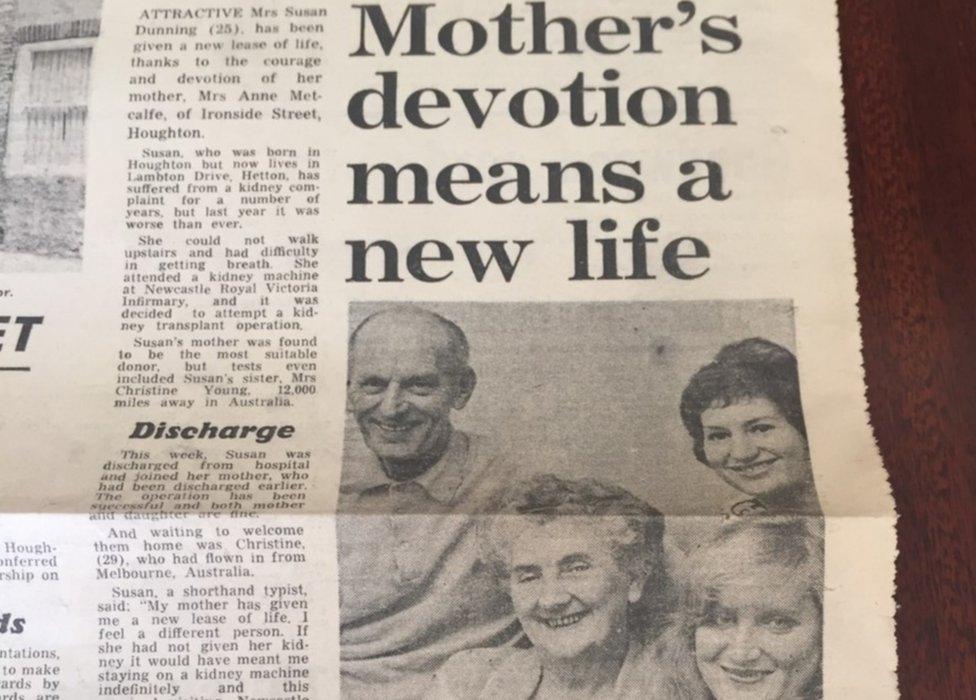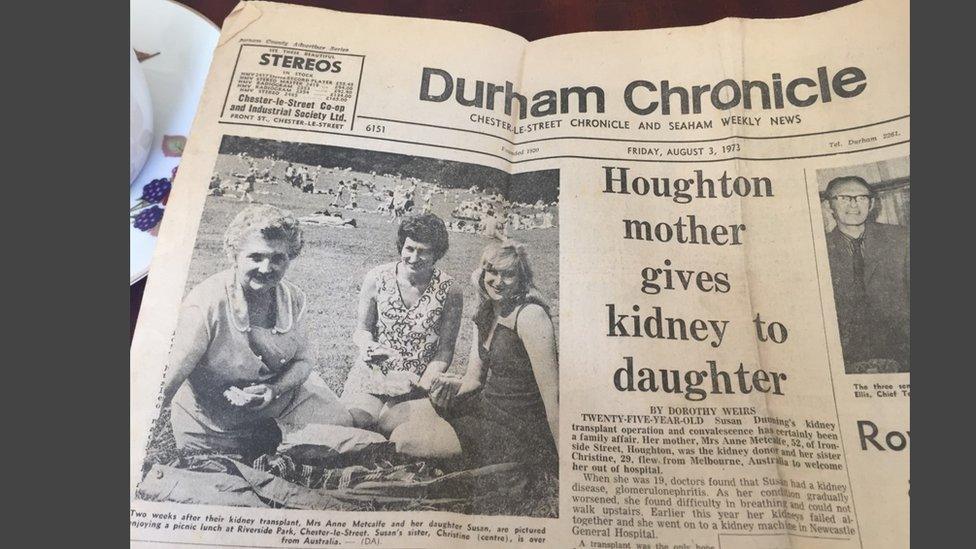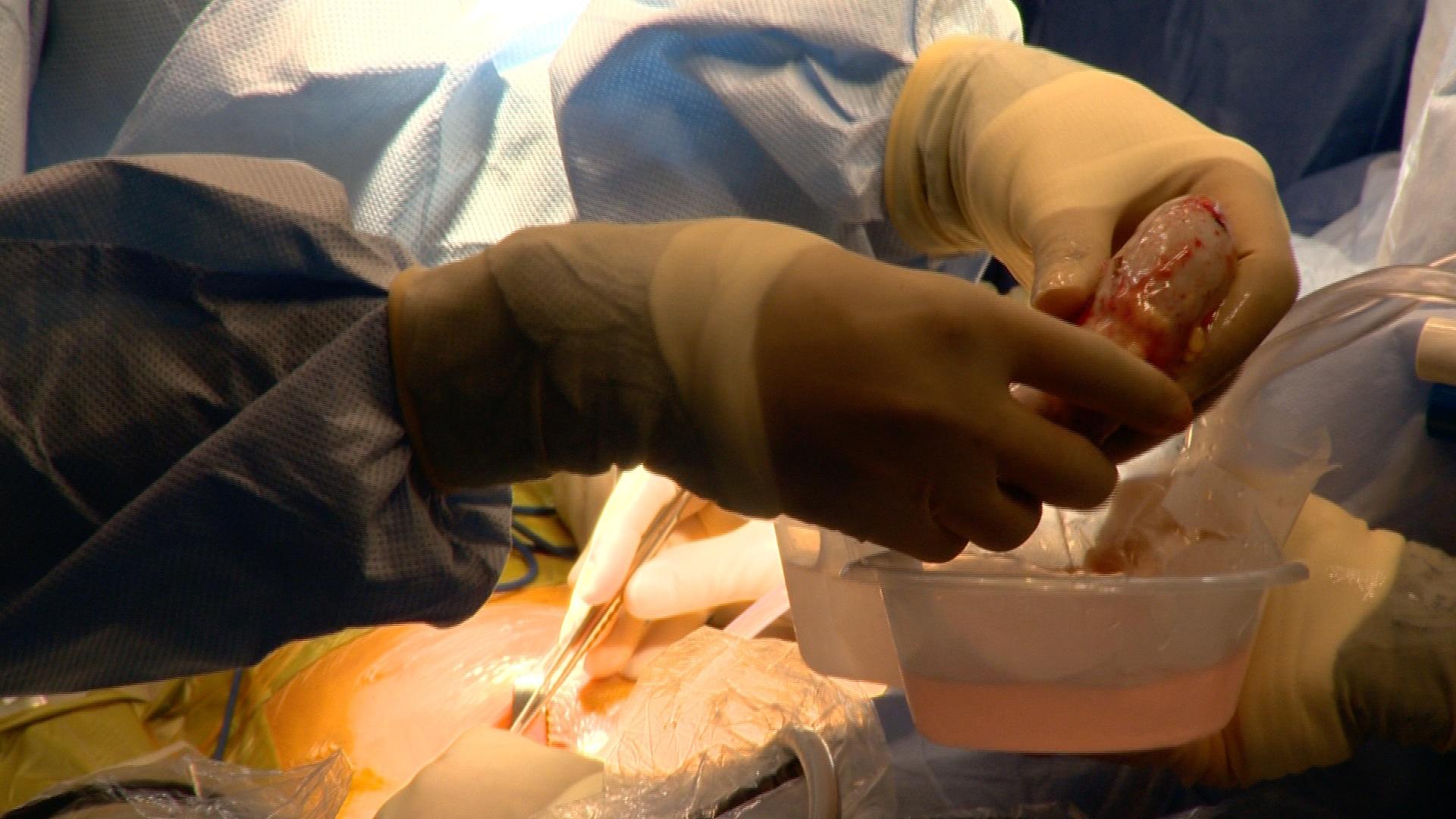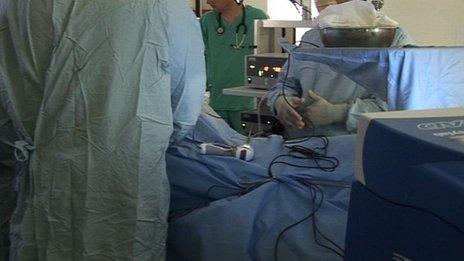Woman with 100-year-old kidney from mum 'still going strong'
- Published
Sue Westhead has taken 20 pills a day since having her transplant 43 years ago
A woman with a 100-year-old kidney has credited its longevity on coming from "good stock". She would know - it came from her mother.
Sue Westhead was 25 when she was diagnosed with kidney disease in 1973.
When told a transplant was her only chance of survival, her mother Ann Metcalfe, then aged 57, donated her kidney to her daughter.
Now Sue, 68, and her kidney are "still going strong", defying medical predictions over the organ's lifespan.

Sue Westhead has taken 20 pills a day since having her transplant 43 years ago
She said: "I think it's down to my mother's good genes. She must have come from good stock."
Sue, of Houghton-le-Spring, County Durham, had only one tenth of normal renal function when she was diagnosed.
Recalling the time, she said: "I could hardly walk, I was a different colour - I was yellow and all of a sudden I had a rosy glow.
"It was a pretty scary time, even when I was still on the ward people were dying.
"My mum literally gave me life because I wouldn't have lived much longer."
Ann Metcalf died in 1985 at the age of 69 following a road accident.

Kidney transplants: The facts
More than 53,000 people in the UK are being treated for kidney failure
90% of people on the transplant list are waiting for a kidney, with 3,000 kidney transplants carried out each year
Unlike many other types of organ donation, it is possible to donate a kidney while still alive because we only need one kidney to survive
The average waiting time for a kidney transplant is 3-4 years
60% of recipients of live donor kidneys can expect to survive for about 15 years

Doctors usually estimate a transplant from a living donor will last 20 years at most.
But Sue said hers is "still going strong" 43 years on, adding she has looked after herself and taken 20 pills a day to make sure the kidney was not rejected.
She said: "I remember thinking 'if I get five years I'll be happy'. That was 43 years ago and my kidney is heading for 101 years old in November.
"You just have to get on with life, not play the victim and wrap yourself in cotton wool.
"I'm pleased my dad didn't come back as a match because he didn't even dare go to the dentist, so it would've been really hard for him.
"If my mum was scared she never showed it. She had to be taken down first obviously because they had to remove her kidney and then I was brought down. We were side by side [in our hospital beds]."

The transplant took place at Newcastle's Royal Victoria Infirmary when Ms Westhead's kidneys were working at only 10% capacity
In 1973, only between 30% and 40% of transplanted kidneys lasted for five years.
The family's story featured in local newspapers as living donor transplants were still relatively rare at the time.
Every three weeks Sue spends two hours arranging her pills for the days ahead - a task she does not enjoy, but one she realises must be done.
And she is delighted with the results.
"I think [my mother] would've been astounded that it's lasted so long," says Sue. "Neither of us could possibly have imagined this longevity.
"Each year when I get to the transplant date I think, 'Well, there's another year'. Long may it last."
Prof Derek Manas, president of the British Transplantation Society, said: "It's an amazing story of encouragement and hope for people on dialysis and for encouraging people to donate as living donors or to join the Organ Donor Register.
"I think Sue must be one of the longest survivors."
Dr Charlie Tomson, consultant kidney specialist at Newcastle's Freeman Hospital and a trustee for Kidney Research UK, added: "It's an absolutely wonderful story.
"Although kidney centres around the UK and internationally have patients who have lived a long time, they are still very rare. We just wish we had more research as to why this is.
"It would be great to bottle whatever Sue has got and give it to other people.
"The success rates of early transplantation have got better and better, so now 97% of living donor kidneys would be expected to be functioning at one year."

Sue said she does not "play victim" and lives life to the full

The family's story featured in local newspapers
- Published9 October 2014

- Published31 March 2014

- Published8 March 2012